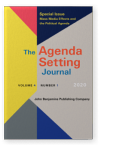Conclusion
Lessons learnt and how to move forward
Article outline
- 1.Expanding the comparative scope
- 2.From contingencies to mechanisms
- 3.Taking the new media environment seriously
-
References
References
Burscher, B., Odijk, D., Vliegenthart, R., De Rijke, M., & De Vreese, C. H.
(
2014)
Teaching the computer to code frames in news: Comparing two supervised machine learning approaches to frame analysis.
Communication Methods and Measures, 8(3), 190–206.


Burscher, B., Vliegenthart, R., & De Vreese, C. H.
(
2015)
Using supervised machine learning to code policy issues: Can classifiers generalize across contexts? The ANNALS of the American Academy of Political and Social Science, 659(1), 122–131.


Esser, F., & Vliegenthart, R.
(
2017)
Comparative research methods.
The In
Jörg Matthes et al. (eds),
International Encyclopedia of Communication Research Methods, 1–22.

Green-Pedersen, C., & Stubager, R.
(
2010)
The political conditionality of mass media influence: When do parties follow mass media attention?.
British Journal of Political Science, 40(3), 663–677.


Jacobs, K., & Spierings, N.
(
2016)
Social media, parties, and political inequalities. Basingstoke: Palgrave.


Jansen, A. S., Eugster, B., Maier, M., & Adam, S.
(
2018)
Who Drives the Agenda: Media or Parties? A Seven-Country Comparison in the Run-Up to the 2014 European Parliament Elections.
The International Journal of Press/Politics.

Sevenans, J., & Vliegenthart, R.
(
2016)
Political Agenda-Setting in Belgium and the Netherlands The Moderating Role of Conflict Framing.
Journalism & Mass Communication Quarterly, 93(1), 187–203.


Sevenans, J., Walgrave, S., & Epping, J. G.
(
2016)
How Political Elites Process Information From the News: The Cognitive Mechanisms Behind Behavioral Political Agenda-Setting Effects.
Political Communication, 33(4), 605–627.


Soroka, S. N.
(
2002)
Issue attributes and agenda-setting by media, the public, and policymakers in Canada.
International Journal of Public Opinion Research, 14(3), 264–285.


Thesen, G.
(
2013)
When good news is scarce and bad news is good: Government responsibilities and opposition possibilities in political agenda-setting.
European Journal of Political Research, 52(3), 364–389.


Tresch, A., Sciarini, P., & Varone, F.
(
2013)
The relationship between media and political agendas: Variations across decision-making phases.
West European Politics, 36(5), 897–918.


Van Aelst, P., Shehata, A., & Dalen, A. V.
(
2010)
Members of parliament: Equal competitors for media attention? An analysis of personal contacts between MPs and political journalists in five European countries.
Political Communication, 27(3), 310–325.


Van Aelst, P., Thesen, G., Walgrave, S. & Vliegenthart, R.
(
2014)
Mediatization and political agenda-setting: changing issue priorities?. In
Frank Esser and
Jesper Strömbäck (eds),
Mediatization of politics: Understanding the transformation of Western democracies. Basingstoke: Palgrave Macmillan.


Van Aelst, P., & Vliegenthart, R.
(
2014)
Studying the tango: An analysis of parliamentary questions and press coverage in the Netherlands.
Journalism Studies, 15(4), 392–410.


Van der Pas, D.
(
2014)
Making Hay While the Sun Shines Do Parties Only Respond to Media Attention When the Framing Is Right? The International Journal of Press/Politics, 19(1), 42–65.


Vliegenthart, R., & Mena Montes, N.
(
2014)
How Political and Media System Characteristics Moderate Interactions between Newspapers and Parliaments Economic Crisis Attention in Spain and the Netherlands.
The International Journal of Press/Politics, 19(3), 318–339.


Vliegenthart, R., & Walgrave, S.
(
2011a)
When the media matter for politics: Partisan moderators of the mass media’s agenda-setting influence on parliament in Belgium.
Party Politics, 17(3), 321–342.


Vliegenthart, R., & Walgrave, S.
(
2011b)
Content matters: The dynamics of parliamentary questioning in Belgium and Denmark.
Comparative Political Studies, 44(8), 1031–1059.


Vliegenthart, R., Walgrave, S., Baumgartner, F. R., Bevan, S., Breunig, C., Brouard, S., Bonafont, L. C., Grossman, E., Jennings, W., Mortensen, P. B., Palau, A., Sciarini, P., & Tresch, A.
(
2016)
Do the Media set the Parliamentary Agenda? A Comparative Study in Seven Countries.
European Journal of Political Research, 55(2), 283–301.


Walgrave, S., & Van Aelst, P.
(
2006)
The contingency of the mass media’s political agenda setting power: Toward a preliminary theory.
Journal of Communication, 56(1), 88–109.


